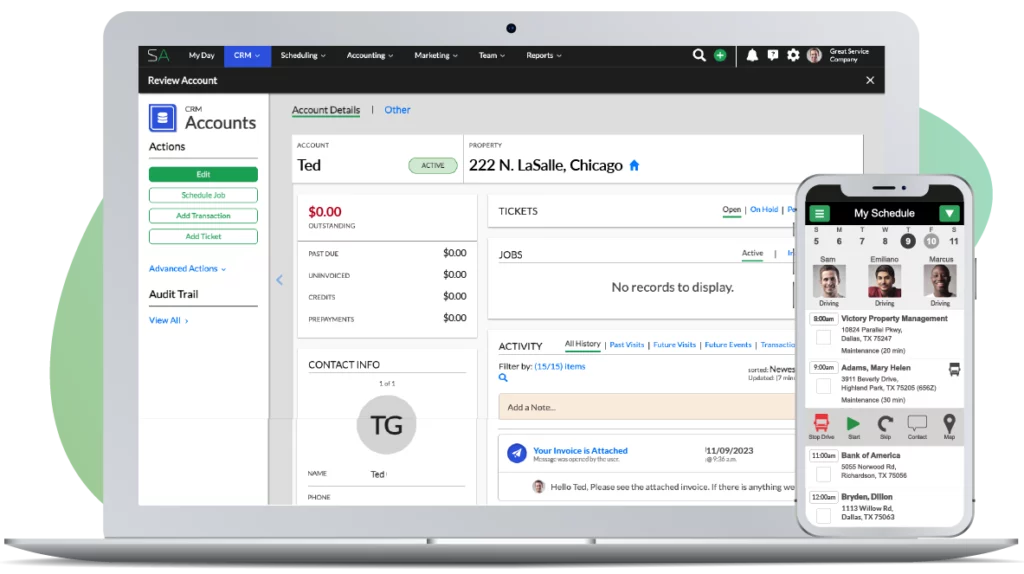Learn How To Grow Your Lawn Care Business Faster and What To Watch Out For.
This question is from Gary. “How do I manage the growth as I start to scale my company?” His situation is a bit unique, so I’m just going to give you a bit of context here to answer this. In Gary’s situation, he is about to put out $225,000 in door hangers over a six week time period to 75,000 homes.
His goal is to bring in 300 new clients and each should be worth about $2000 a year. What is unique is that, his model is one where he sells the client, and then contracts the work out to a Lawn Care Operator or to a partner. In other words, he contracts the workout to another service provider to take care of it. It’s a really interesting model, and there are upsides and downsides to this business model. He’s asking, “My main concern is handling the growth. Do you have any suggestions for handling the growth of this operation to maximize my possibility of success. Thank you.”
In this model, the model of contracting, you immediately eliminate a lot of your problems and you eliminate a tremendous number of your scaling problem. That’s the beauty of this model. The problem with this model, is it creates a different set of problems, in term of scaling the company.
This is the fastest way to scale your company, from my experience. I don’t know what your model is, in regards to, do you own the equipment or lease it back? Do you provide the equipment or does the LCO? If they provide the equipment, you do truly eliminate most of your scaling problems. You’re selling the work, and then you’re managing the contractors.
For your business here Gary, the key to scaling, is going to be technology.
It’s going to be software to run the business. It will be marketing software, sale software, and everything around software. You’ll also need a good phone system. I could see in this tech business model, you could run a virtual type office setup if you wanted to. There’s positive, and negatives to that. The core of your business is going to be a really good software platform.
That’s key in the process of scaling the business. You’ve got to have that taken care of. With this model you’ve got to focus on two areas, in my opinion. One, is a really good sales process. You need to craft that out all the way down the ladder. You really have to be a sales and marketing company. You have to have something in place, to make sure your marketing is constantly happening.
Who’s in charge of the website? Who’s in charge of SEO? Is it internal, or maybe a partner or contractor? Who’s in charge of the content for your marketing strategy? Who’s doing pay per click, door hangers, direct mail, and all the different marketing strategies?
You might be the guy that starts doing some of that but, pretty quickly, you’ve got to get some of the stuff off your plate. As your company grows and you get busy, those things will stop happening.
Number two is, you really need to be thinking about what might get neglected, or what is getting neglected now from a marketing stand point. Start putting people in place now to take over those things. If you need door hangers or post cards going out, or whatever, who can you put in place to do that? Your whole business comes to a screeching halt under this model if you’re not really growing.
That’s true for everybody’s business. But yours, is one where you’ve got to really generate a lot of sales and get a lot of work out there in the market place for contractors to do. You got to make sure that engine doesn’t stop humming. You’ve got to put people in place as you scale to take care of that.
At first, it can just be inexpensive people to do some basic work. Getting the post cards ready, getting the letters ready, stuffing envelopes, signing or hand addressing them, whatever those activities are. Then, overtime, you may need a more sophisticated person that can handle that stuff. Along with that, you’ve got to craft your whole sales process…exactly what happens once the marketing goes out the door.
The next area of scaling is going to be making sure that your phones get answered. As you get busier, you’re not going to be able to answer the phone, and it will be more difficult for you to handle the activity of the business.
Just imagine that every time the phone rings and you don’t answer it, it was a potential client on the phone, and you lost the sale.
For example, you said that your average client will be worth about $2,000 a year. If they stay with you for four years, just imagine that every time you don’t answer the phone, you lose $8,000 that should have been in your pocket. That is exactly what’s happening.
Who is going to answer the phone? And, when you are on a call and the phone starts ringing, who is going to answer that? That’s another person you’re going to need to think about and put in place.
Most people imagine that job is an inexpensive $10, $12, $14 an hour job. It can be, however, you don’t put your cheapest on the phone, at the face of your company. You want your best people on the phone. Remember, if you don’t answer the phone, you are losing $8,000 every time. If you have someone to answer the phone and they always botch the call, it is the same thing.
It’s even worse now, because now you’re actually paying them to cost team sales. That’s an area that you really have to pay attention to. Part of crafting this whole sales process includes training somebody else to take over for you.
How do you get somebody else that understand everything you understand? How do you get somebody else to do and say the right things? It’s going to require your training and your time to get them up and running while you do all the other things in the business. It’s difficult.
In time, you’re going to need to be thinking about scaling this area where you get somebody on your team that is highly trained, and then they train other people as you scale up the business. Be very aware of what the sales messaging is, and the wording that you want to hear them use. In time, you probably need to scale up your phone systems, so you can record all of your phone calls. Then you can listen to them, and be able to go back to your team with specific ideas of how to improve. You’re going to have to be on top of all of that. The sales process is going to be huge.
Think of yourself as being in too distinctly different businesses. One, you’re a sales and marketing company. What does that mean? If you are sales and marketing company, what does that look like, how do you talk, how do you act, what do you focus on? Then, on the flip side, you are a contractor management company. What comes with that? That means that you’ve got to spot check work. You can’t assume the contractors magically know how to do the best work, are the best guys in the industry, and know all the shortcuts.
You’ve got to educate them, help them, and guide them. Yeah, they’re not your employees but, that doesn’t mean that you don’t have to still do all of that same kind of stuff. You want great contractors that build you a great reputation, and your reputation makes it either easy or hard for your sales guys to sell. Your reputation makes your marketing either work well, or not at all. Your reputation is key. You absolutely must manage your contractors.
You’ve got to help them become great and efficient. You have to teach them the little things that so many of these guys don’t already know. Look at the majority of your competition. They are nothing exceptional. There’s nothing exciting about most companies, your competitors. The same is true of most of the guys you’re going to contract to. There’s nothing great that they’re doing, and you’ve got to help them with that stuff.
On the sales side, I think the biggest point I’d like to make here is, make sure you eventually have somebody in place to help you train and listen to your sales team.
Make sure the right things are being said and the right outbound calls are being made to up sell.
Then I would take it one step further and make this point. I was a partner in a cleaning company and our typical job was between $30,000 and $150,000 a year. That’s what a typical client was worth to us. It was all commercial, but our entire business model was contracting. It’s very similar to what we’re talking about here. So, I realize how challenging it is to get contractors to perform quality wise at the same level as a well-trained, well managed employee.
Going into this, just assume that you’re going to have contractor problems. Things aren’t going to be perfect. You need to build up some forgiveness.
What I’m getting to here, is that you really need to build the relationship with your client. You don’t want your sales guy to go out there and just sell the job, and win the business. From that point forward, all of the clients interactions are going to be with your contractor and your team in the office, assuming they are the ones doing your billing and scheduling.
Your team in the office needs to further that relationship. Your mailers, your direct mail, your letters, your e-mails, your phone calls…everything that’s coming from your office, needs to further that relationship. In my businesses, in the first week or two, we really really tried to build a great first impression. We went over and above the norm.
We wanted to make sure that everything went smoothly and that the client was happy so that they had a great experience from day one. That way, if in a month there’s a problem, they don’t immediately assume that’s just how this company is.
This is critical. You need to build up a bank account of forgiveness with your client. You have to come in and create a wild experience from day one. You’ve really have to focus on that. Think about that first week or two or maybe as far out as their first 90 days. What does that look like to your client? How do you act? How do you talk? What do you send them? What do you do? Because you really need to get off on the right foot.
In the new world we live in, anybody can go out and give you a bad review on Facebook, Yelp, Angie’s List, or Google, and you can’t get rid of it. It’s very difficult. You have to be very aware of that, and protect your reputation.
All of that has to be a consideration in scaling. I think in time, because you can’t wear all of these hats, you need to have somebody that’s managing marketing and making sure it’s going out. You need to have somebody that’s over sales and training and making sure it’s happening. You need to have somebody that’s in charge of the first impression and managing that initial relationship, welcoming new clients and taking care of them. You need to have somebody else working with the contractors. Contractors come and go. You have to have contractors ready to go, on a dime. You have to constantly be recruiting.
To summarize, you’re in two businesses. You are a sales and marketing company and a contractor management company. Those are your two distinct businesses. Within that, you have five distinct roles. You have your first impression team that impresses the client and builds up a relationship with them. Then, you have your office team, and your marketing team. Then you’ve got your recruiting of contractors and the management of contractors.
Not that those are five different people, but those are five big elements in the business. If you break it down on paper, and you design it out, and you think about what all the things are that each of those five roles will be doing, that will help you think about what’s coming from a scaling standpoint. What kind of people are you going to want to hire? What type of personality will be best for this position? What characteristics should this person have to be successful in this role?
One of my partners, he was actually the president of the company, was really savvy in the area of legal and accounting stuff. He wasn’t cheap about it. He was willing to spend the money on good legal counsel and good accounting advice.
It was especially important in the contractor model. Here in the US, there’s a checklist of things that you have to abide by, it’s kind of a test, to say whether or not this person is really a contractor or an employee. In the US here we’ve got all this legal risk if we’re wrong. From a payroll standpoint and from a litigation standpoint.
You really want to be on top of your game in this area. I would imagine it’s the same for you in Australia. I would recommend that you don’t be cheap, and early on make sure you have your ducks in a row around contracting. Anything legal and anything accounting. That’s the stuff that can really destroy a nice business later on. Pay close attention to that.
You want to give your contractors enough motivation that they stay with you. You want to give them enough incentive to really perform, but you don’t want to overpay. And, if you start out overpaying, you can’t pull back without losing them as contractors.
A lot of guys starting in the contractor business, really underestimate their cost. They picture that most of the cost is going to be taken on by the contractor, but they forget about the sales marketing cost and the administrative costs.
As you scale the company, if you want to change compensation, or try different incentives, test them with a contractor. If it goes well, test it with a second contractor. But, don’t roll out your pay scale, and your incentive ideas, to your entire contractor base. Test things first and then roll them out.
So, I hope those are some points that will help you think about scaling. It’s a great business model. I think if you perfect it, there are a lot of rewards to be had. Good luck.


